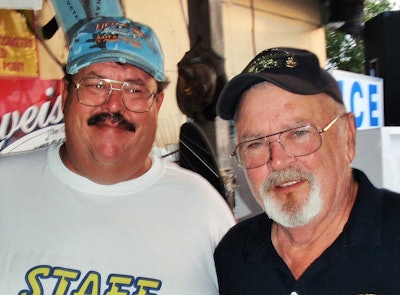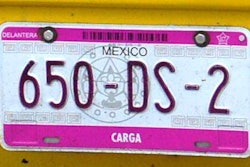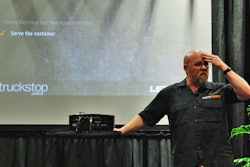“I’m not some college kid coming into a big cubicle farm office. I came in from a driver’s seat.” –Brian Hardman, Fulmer Logistics
I had a chance to catch up with the go-to broker from my owner-op days, Brian Hardman of Fulmer Logistics. Brian’s bread-and-butter accounts for years have been the Florida super-nurseries that require reefer trailers with e-tracks and decking, and drivers willing to hand-unload and palletize 2,000-plus loose plants to around a dozen or so big-block stores per load, from Florida to as far away as Fairbanks, Alaska.
 Hardman (left) with a longtime friend, the late author and Navy veteran Chief Jim “Patches” Watson
Hardman (left) with a longtime friend, the late author and Navy veteran Chief Jim “Patches” WatsonThe Fort Pierce, Fla.-based based agent, for as long as I have known him, has possessed the diplomat’s knack for telling a person to go to hell in such a way that they looked forward to the trip. He even talked me into hauling a load of tropical plants from Florida to Alaska for him in January. Twice. His business model requires long relationships with a committed corps of reefer haulers who don’t mind getting their hands dirty; or to put it another way, the recruiting skills of Nick Saban and the retention history of UPS.
The son of a high-school math teacher, one Robert Earl Hardman, originally from West Virginia, who coached Dixie League baseball for 40 years, this frank Floridian’s gift of gab and life’s philosophies have continued to endear him to this gearjammer for years following my old International being put on the auction block.
Brian Hardman
Fulmer Logistics
Age :56
Past Jobs: Radio and bar/club DJ, bartender, tow truck driver, OTR truck driver. (Hardman opened his Fullmer Logistics office on January 7, 1996.)
Long Haul Paul: Have relationships changed in the load-board culture versus the good-ol’-boy-with-a-black-book days?
Hardman: Sure! I’m not some college kid coming into a big cubicle farm office. I came in from a driver’s seat. To this day, an internet load board is a last resort in my office, as it always has been. Good drivers are like money in the bank and know who to call. The load boards are a gamble, both for me and for carriers too, really. I’ve had load board guys who have been terrific, and I’ve had some who were rolling nightmares! But my “regulars” are always my focus and priority. There are months in Florida when I could load net-board trucks for 30 or 40 percent less than I pay regulars, but I don’t. I think long-range.
These boys at some brokerage outfits think only about this week’s money and are always looking for new trucks because they’ve screwed over the old ones. I want to keep good drivers. So even when it’s slow and trucks aren’t tight, my guys still get paid! And that is why they stay my guys. So I, in return, get to live with less drama and very rarely see claims. I have drivers who have been with me over 10 years. How many brokers can say that? It’s simple in my mind. I treat my guys the way I wanted to be treated when I was driving.
“Here in Florida, trucks have four months to screw me.”
LHP: We hear a lot about drivers holding up a broker for $5 a mile at the 11th hour. Does the broker sometimes lose money in a case like that, or does that get passed on to the shipper? Have you ever lost money this way? Conversely, we hear a lot about brokers taking 50 percent off the top in a double- or triple-broker situation. Are these both symptoms of the same phenomenom, i.e. the brave new world we live in where technological access trumps relationships?
Hardman: The circle is pretty damn simple if you look with a little logic. I have to sit on the fence, and sometimes a fella can get a mighty sore crotch that way. First you have to have shippers, then you need trucks. If I have one without the other, this time next month I’m asking if you would like fries with that order! So I’ve got to strike the balance of having rates low enough to get the business while high enough to pay the trucks a rate that they can haul for. So to keep business, I try to never give a load back to a shipper, but it does happen sometimes. To avoid it, I have overpaid loads. In fact, circumstances forced me to lose $600 on a load a couple weeks ago; but obviously that’s really not what you call a sustainable business model. And know this: we keep notes! Here in Florida, trucks have four months to screw me; that leaves me plenty of year to lowball somebody that hoses me in the Spring. On a personal level, I hate that part. I make a comfortable living with an honest 10 percent and my regulars know I won’t hose them off-season. But when I require extra trucks in Spring and an outside truck wants a bigger rate, if it’s reasonable I’ll pay them. With some shippers you can call and say I need “this much” to cover it, but with contract rates sometimes you just have to swallow the sword, think long-term and eat the loss. It can be a tightrope! As for the double brokering of loads? I know it happens … but not in my office. While it is trucks we load, we as an industry should remember there is a person driving the truck. And that person, like all of us, needs to make a living, not get hosed down to breaking even!
Addressing the “brave new world we live in where technological access trumps relationships” part, I see that, so far, with shippers more than carriers, but I find it alarming! Between email and social media I do see Americans not connecting on a one-to-one basis as we once did. Some people have 600 friends on their little tweetface thingy, but how often do they pick up a phone or actually visit someone in person? Not good! When I started as a broker, I had a phone, a rolodex and an electric typewriter with triplicate carbon forms.
Remember the old faxes with that rolled paper that curled up? Now I have a computer that I can put an MC number into and the thing will “fetch” the company info and self-populate the details! So, like most change, it’s part good, part bad. Maybe I’m just old and jaded, but my observations suggest the smarter the machines get, the dumber the user seems to become.
“This is the first year I’ve seen trucks get tight in Florida in February.”
LHP: How tight are good trucks in the ELD economy?
Hardman: Strictly speaking, good trucks are always tight, and pretty damn rare! As average Joes goes, it appears projections of truck shortages may be true. This the first year I have ever seen trucks get tight in Florida during February. I’ve raised reefer rates about 12 percent so far in 2018 and wonder if it’s enough. I suspect it won’t be. If I had to guess, I’d predict (albeit with a small perspective and limited data) it will land closer to 16 percent. More in hot zones.
LHP: Are most of your trucks still regulars, or have you had to rely more and more on the load boards?
Hardman: As you’ll remember from once being one of them, I have always maintained a core group of top quality people — the guys with me year-round; but currently I’m recruiting as my demand has grown. The off-putting part is I used to have guys on the bench. People who knew one of my guys and wanted in on the year-round, steady work. Because with a lot of brokers they were/are using, rates suddenly drop way off after the Spring rush; funny how that happens, right? That has dropped off in recent years. I have found recruiting people up to our standards is tough! You have to kiss a lot of frogs.
LHP: Once or twice, you invited me to come audit your books, as is the carrier’s right under the law. You told me, “I may have got you for 20 percent on the first load, but after I saw what you could do with a plant load, it was 10 percent from then on.” How many actual audits have you known to occur between a trucking company and a brokerage office? Are they ever done on a routine basis?
Hardman: While I have, on occasion, invited some trucks to pick a couple load numbers and I would show them what I invoiced, it was rarely necessary. It changed last year to all digital, but for years I would get a page from a nursery showing the list of drops, load date, load number and rate, and because the truck always wants to know where all the drops are, I would send that to the carrier along with a load conformation. So when the truck sees what I’m billing, they see for themselves it’s 10 percent. So I’ve never had an audit requested. But hear me, drivers — don’t ever be too shy to ask if something seems wrong! Ain’t nobody going to count your money better than you. Everybody makes mistakes. I’ve sent loads where I’ve left off drop pay … or fuel surcharge … it happens, more often when we are real busy. But a good broker has no issue with someone calmly asking for a review.
If a broker sounds dodgy about numbers and rates on a callback, he might be trying to remember what he told you in the first place. If you don’t tell lies, you never have to remember what you said.
*********
Still, as online freight platforms continue to abound and load matching technologies become more refined and predictive, Hardman openly wonders whether his business model, deeply rooted in that distinctly Southern working class culture of honor, is long for this world.
“I don’t know how long the year-round rate will even be around, now,” he says.
In a world where, as a longtime Okeechobee cow hauler once told me, “there ain’t much call for a good ol’ boy no more,” the old trucker turned broker now sees the rise of trucker-centric apps that aim to “cut out the middleman” charging full steam ahead in his rear-view mirror like some unmanned Uber truck with 22 tons of beer in the box.
When I asked if he still had his CDL, he just laughed. “Oh yeah. You never know what’s going to happen out there.”










